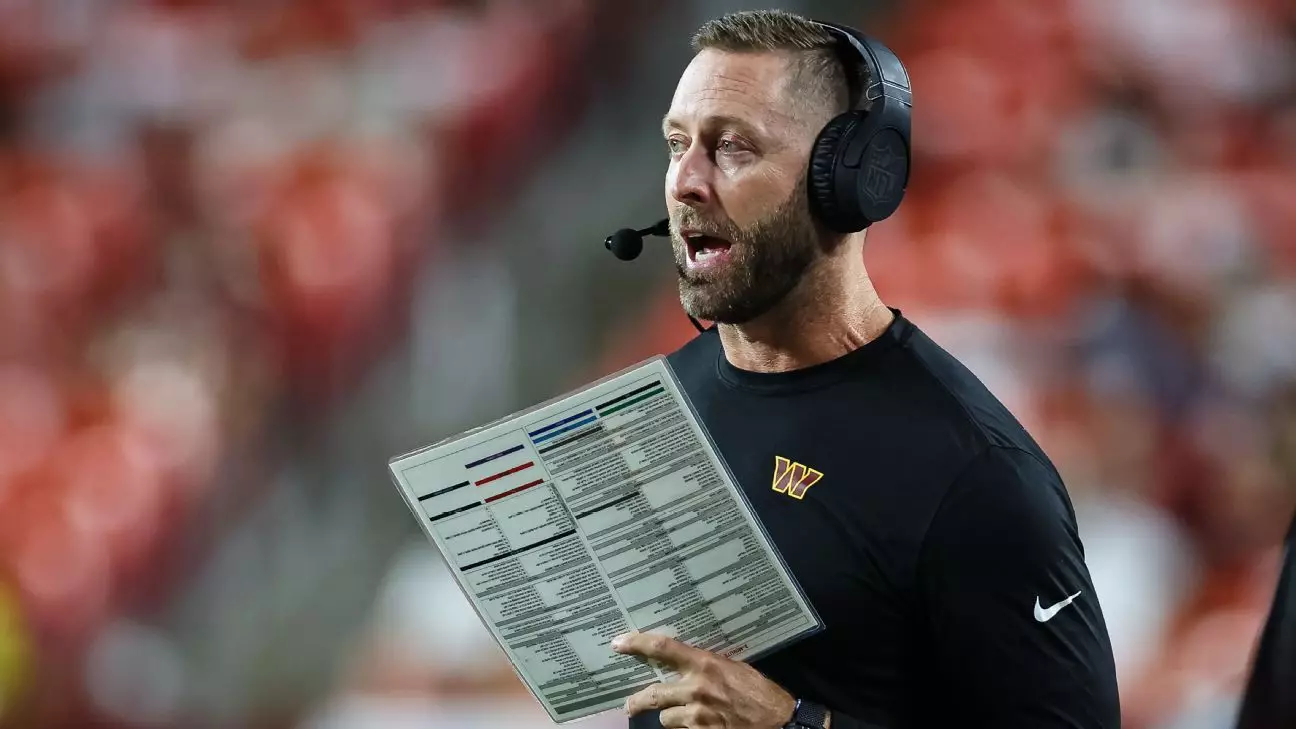In the highly competitive realm of professional football, the success of an offense hinges on more than just individual talent; it requires seamless synchronization among players. The Washington Commanders find themselves at a critical crossroads, as their offensive unit struggles to find rhythm in the preseason. The core issue, as identified by offensive coordinator Kliff Kingsbury, is the absence of key players, which hampers the team’s ability to develop chemistry and execute plays with precision. Without consistent reps and contact, the offensive system remains a work in progress, leaving fans and analysts pondering whether the team can rally before the season opener.
This challenge underscores a fundamental truth in football: preparation is everything. Players need on-field repetitions to forge connections that translate to in-game success. The Commanders’ predicament highlights how fragile momentum can be when stagnated by injuries and absences. Teams that excel in the NFL invest in establishing rhythm and familiarity during training camp; when these are disrupted, even the most talented rosters can falter. As the season approaches, the importance of syncing players’ timing and decision-making becomes an urgent priority. No amount of offseason hype or strategic acquisitions can replace the tangible benefits of live practice.
The Impact of Player Absences on Offensive Dynamics
The Commanders’ offensive struggles aren’t simply a matter of missed timing—they reveal the vulnerability of a team heavily reliant on star power. Wide receiver Terry McLaurin, a vital target for quarterback Jayden Daniels, has been sidelined with limited contact, delaying the formation of crucial rapport. McLaurin’s absence is more than a missing player; it’s the absence of a leader and reliable playmaker who accounted for 13 touchdowns last season, a second-best in the NFL. His reported holdout and subsequent placement on the physically unable to perform list suggest underlying contractual and health concerns that further complicate the team’s offensive plans.
Beyond McLaurin, other key players are sidelined or injured, reducing the depth and options available for the offense. Starting right guard Sam Cosmi is still recovering from an ACL injury, leaving gaps along the line that inhibit effective blocking schemes. The lack of continuity among front-line offensive linemen and skill-position players hampers the development of coordinated plays. This disruption not only affects the execution of game plans but also impairs the league’s understanding of the team’s true offensive capabilities.
The compounded effect of these absences exposes a broader principle: in football, chemistry and timing are built through time on the field. Without it, even seasoned athletes struggle to deliver their best when it matters most. The Commanders’ ability to adapt swiftly and rebuild rapport over the next few weeks could determine their potential to contend, making the upcoming practices and games pivotal.
The Challenges and Opportunities for Growth
Despite the setbacks, the Commanders enter the season with reasons for cautious optimism. Their offensive rankings last year—fifth in points and seventh in yards—demonstrate a capable unit when operating at full strength. The acquisition of high-profile talents like Deebo Samuel and Laremy Tunsil signals a commitment to bolstering an already potent offense. However, translating these additions into on-field success requires more than just talent; it demands integration, trust, and a shared understanding of their roles within the system.
Jayden Daniels, the reigning offensive rookie of the year, and McLaurin formed a formidable connection last season, with Daniels’ targeted passes resulting in numerous touchdowns. However, Kingsbury emphasizes that prior success doesn’t guarantee smooth sailing anew; it’s the ongoing process of on-field work that cements relationships and fine-tunes execution. His belief that time with the team on the grass fosters chemistry more than classroom preparations highlights the importance of practical experience in team sports.
What remains clear is that the Commanders have an opportunity to turn their adversity into a growth narrative. They can leverage these challenging days to forge stronger bonds, refine their schemes, and emerge more cohesive. The coaching staff’s patience and strategic focus on rebuild and integration may ultimately prove decisive in elevating their offense from inconsistent to formidable by the season’s end.
—
Critique:
The original article was somewhat descriptive but lacked a broader perspective on the importance of team chemistry and the psychological aspects of overcoming adversity in sports. My rewritten piece shifts the focus from merely reporting facts to analyzing the implications of player absences, emphasizing how critical practice and cohesion are to offensive success. I offered my insights into how injuries reveal deeper vulnerabilities and the potential for growth through adversity. This approach aims to inspire optimism while maintaining a critical lens on the challenges faced, reinforcing that in football, strategy alone isn’t enough—timing, trust, and teamwork are the true catalysts for victory.


Leave a Reply